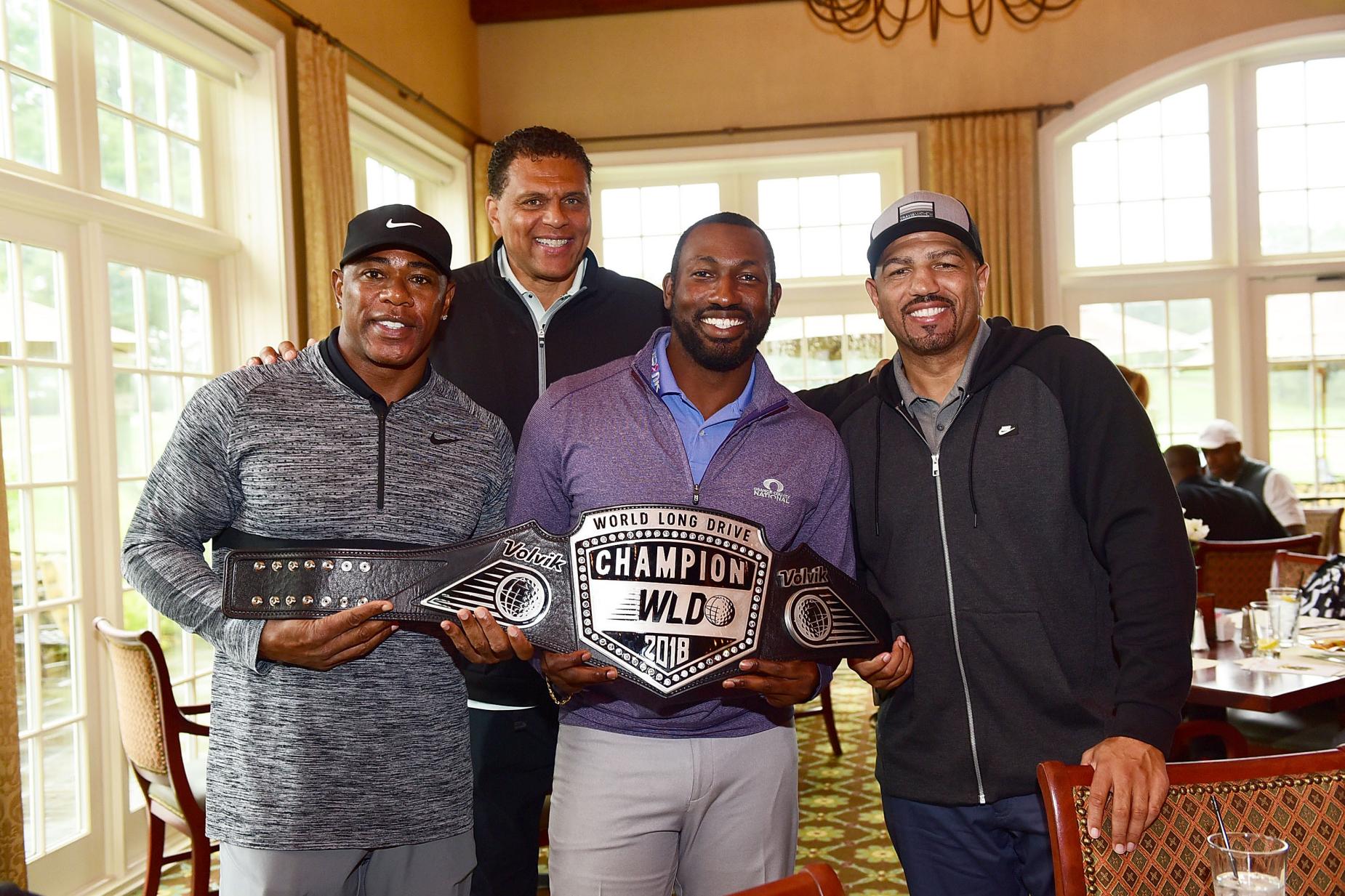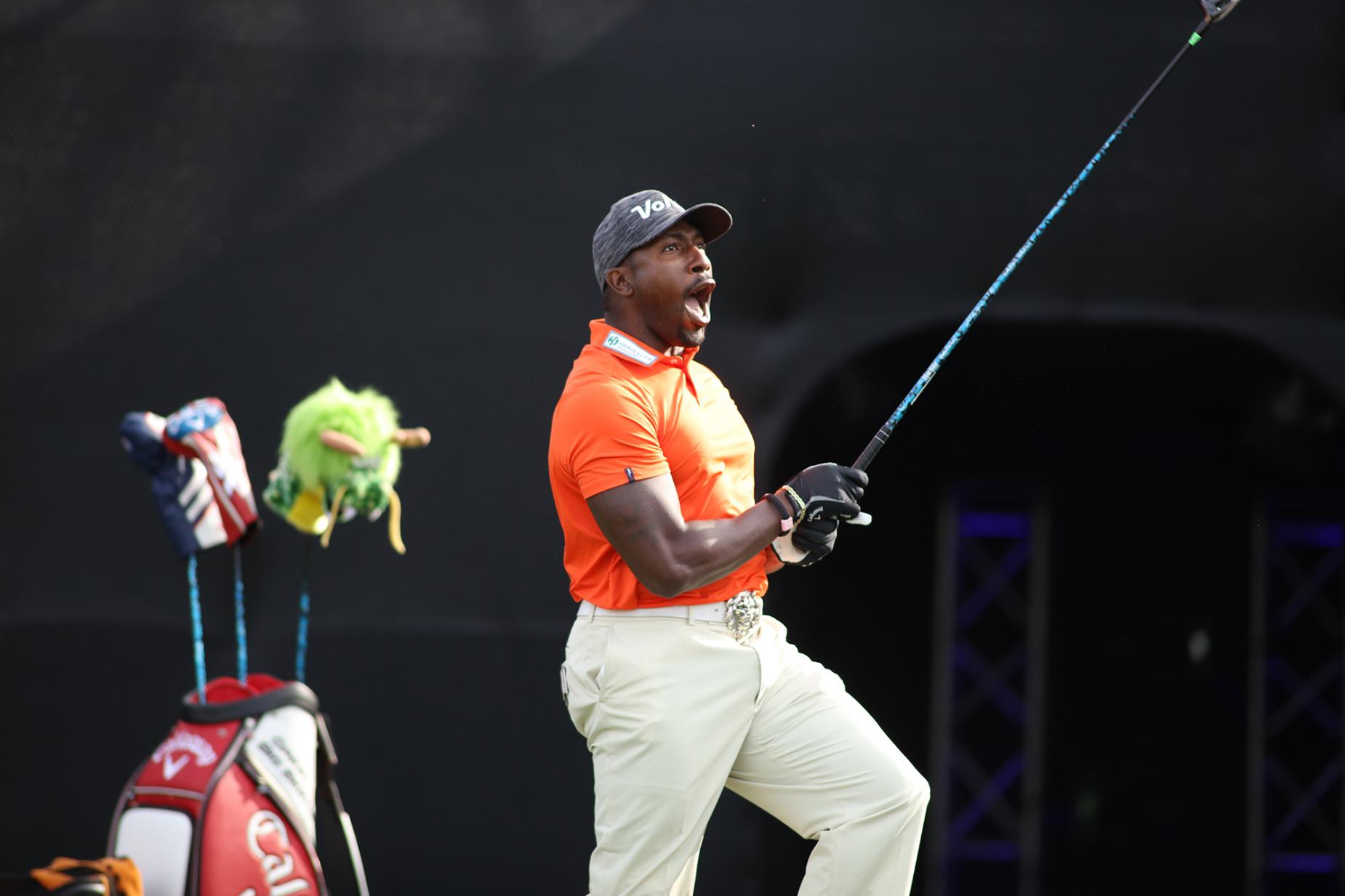Long Drive champion Maurice Allen.
Photo: Nathaniel Welch
By Maurice Allen
Editor’s Note: Following the national and global protests in wake of the killing of George Floyd, Long Drive champion Maurice Allen reached out to Golf Digest asking for a platform to speak. Here are Allen’s words on his experience as an African-American man in golf. —Joel Beall
I am a golfer, just like you. But I’ve been the person on the side of the road, pulled over with a gun to my head for something I didn’t do. I’m guessing that is what makes us different.
But you don’t want to hear about that, right? We’re here to talk about golf. So let me tell you what it’s like being black in a white sport.
In my part of the game, the long-drive arena, we’re supposed to be flashy, to be entertainers. Except white long drivers are praised for being colourful and flamboyant, while I’m called a showboat. Well, “showboat” is putting it nicely. Just yesterday I received hate mail, accusing me of race-mingling, calling me “Django,” that I’m as worthless as our previous president, “Obama Bin Laden.” That’s just from, ahem, “fans.”
Often I’m the only black man in a competition. That puts me in spots and places I don’t want to be. I’ve had competitors and their families straight-up rain n-words and racial slurs on me without remorse. Last year a rival’s father went on social media saying I had been arrested, that I was a criminal. I have never spent a night in jail, so I fired back, “Show me the mugshot and I’ll quit on the spot.” And guess what? My sponsors are mad at me for trying to defend my honour. Did my rival receive any backlash for the racist conduct of his father? You already know the answer.
I wear my blackness with pride, the same way an Alabama or LSU fan cheers on their team. That rubs people the wrong way. Like, I’m a nice story to tell— “Hey, an African-American in our sport, look how good we are doing!”—unless I’m the one telling it. Case in point: A few years back, I was in a televised event, and they had interviews with each contestant. When I was asked what drove me, I repeated what I repeat to myself every day: “I am the prayers of slaves who worked in the field, to know that people have been beaten, raped and killed for me to have this opportunity that they knew they’d never get for themselves.” I’m the only one whose intro didn’t make its way on air. I get it. Too many confuse being pro-black as anti-white.

Lisa Lake
I understand some want to help the racial inequality that permeates golf. Or, at least they tell me they do. Let me tell you how it works. I get invited to do a talk at a conference or participate in some type of roundtable about diversity in the sport. After I’m done, people get emotional, come up to me and say thank you, and promise me they’re going to help. They talk a great talk. And then, a week later, my phone calls are going unanswered. Or there’s red tape. Or, “You know, we want to help, but now’s not a great time.” Then the same people ask me back the next year to the same conference or show. I’ve realized they don’t care about a cause; they want to check a box. But I still go, hoping my words will reach someone new in the audience.
That’s what breaks my heart about golf. It’s supposed to be a game of integrity. I’ve found it to be anything but. I’m not talking about it being elitist. I’m talking about its entitlement. To me, that word means something different. Because when you’re entitled, you have a responsibility to use that privilege in a meaningful way. Instead, golf acts as a club. It’s often hard to get in, or it makes excuses for the errors of those in the club. We have given so many excuses for foolishness that you delay change. You’re not dealing with the actual situation. If we have a problem, we have to address it.
I live in the South. I can’t tell you how many times I pull into course parking lots to see cars littered with confederate flags. And every time, I’ll ask, “Hey, what is this?” And the defences never fail. “Oh come on, it’s not what you think it means,” or “Don’t worry, he’s really a good guy.” There’s no accountability or the slightest amount of empathy of how it makes me feel.
That accountability goes to the leaders in golf as well. I was owed a performance bonus from my 2018 season from a sponsor. A few weeks ago, I demanded it get paid. The response I received was, “Are you in an OK financial position? If not, we can move some things around for you.” They then acted like things were tight at the company, telling me, “You’re not the victim here.” Save for the fact I know three of my competitors all received their bonuses from just last year. Anytime I have to defend myself to get what’s mine, I’m seen, as a black man, of being difficult or hard to work with. As a black man, you’ve been taught to conform since the day you leave the womb. If you break that unspoken law, there are consequences.
Just last week, on Memorial Day, I made a post saying I was going to memorize and memorialize all that have lost their lives who weren’t wearing military fatigues, fighting this never-ending battle for racial justice in America. If you look at the comments on the feed, it’s the usual “You’re disrespecting the flag” or accusing me playing the race card. That crap, well, I expect. What I didn’t expect was one of the ruling bodies of golf to call me THREE TIMES asking me to take the post down. I am scheduled to do an event with them, and they found the post polarizing. This is an organization that’s, allegedly, trying to grow the game. It is systematic, man.
A lot of times “Who” is the biggest problem we face in America. We can’t be on the leading front. If Colin Kaepernick had been J.J. Watt or Ben Roethlisberger, people would have listened. But Colin isn’t white. I’ve experienced it. I have a foundation that helps grade school children build saving accounts, called “Saving Christmas.” Another endeavour is trying to raise $40,000 to fund the professional aspirations of two golfers who come from HBCUs that don’t have the sponsors or country club patronage that most white players have. Earlier this year at a meeting with a major golf company, pleading for financial help, I was asked, “So, what is in it for you?” Well, I’m not a middle-schooler and I sure as hell ain’t 20 anymore. I’m just trying to help, but even that I have to do with my hands tied around my back.

Do I think what we’re seeing is going to change things? No. The only difference now is people are pent-up from the coronavirus pandemic, and looking to unleash that frustration. I hope I’m wrong, but I fear in two weeks everyone will be back to Tik-Toking while another black man is murdered for no good reason. I mean, we said the exact same things when Trayvon Martin was killed. That was eight years ago. Think about all the lives lost since that could have been stopped if we really were committed to making things right.
The past week has made me take stock of things. I’ve had an amazing run. But amazing isn’t up and down, it’s not linear. I have to take that. But I fight for growth and professionalism. My brother has always talked about immortality. He’s not referring to cryopreservation or living like a vampire. It’s about, when we leave this world, will people still remember what we’ve done. And I will continue down the line. I won’t, and my people won’t, be forgotten.
But I, we, need your help. If you’re reading this, it means we’re connected by golf. You may be wondering what you can do. We are vastly underrepresented. There are more of us than Tiger Woods and Harold Varner III. The participation rate of blacks in golf hasn’t changed since Tiger has come on the scene. That might not be your fault, but whatever you’re doing isn’t helping, either.
Golf is supposed to be an accountable sport. You hit a bad shot, that’s on you. You break a rule, you call it on yourself. Stop making excuses or guessing someone’s intention. Start using that same accountability you apply to golf to racism, sexism and injustice. Ask your club what they are doing to recruit minorities. Call out your buddy making racial jokes on the course. Educate yourself on black foundations that aren’t just The First Tee. And, maybe, we might get to the other side.
Maurice Allen became the first African-American to win the World Long Drive championship in 2018 and holds the Guinness World Record for highest golf ball speed.









